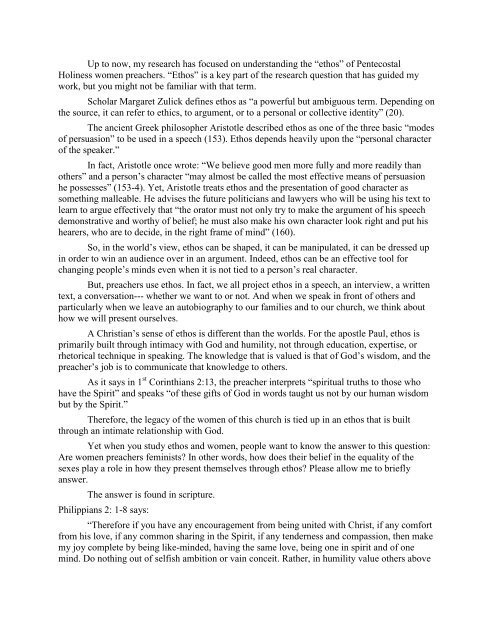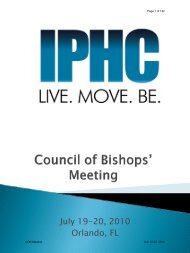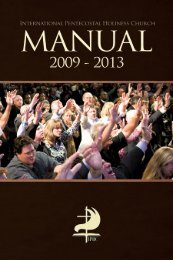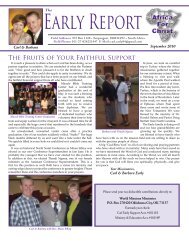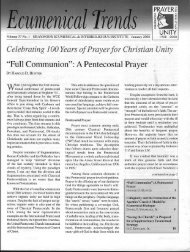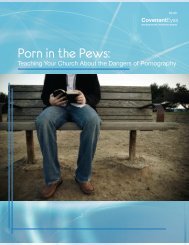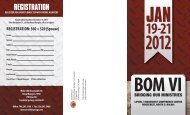Women Preachers in the IPHC - International Pentecostal Holiness ...
Women Preachers in the IPHC - International Pentecostal Holiness ...
Women Preachers in the IPHC - International Pentecostal Holiness ...
Create successful ePaper yourself
Turn your PDF publications into a flip-book with our unique Google optimized e-Paper software.
Up to now, my research has focused on understand<strong>in</strong>g <strong>the</strong> “ethos” of <strong>Pentecostal</strong><br />
Hol<strong>in</strong>ess women preachers. “Ethos” is a key part of <strong>the</strong> research question that has guided my<br />
work, but you might not be familiar with that term.<br />
Scholar Margaret Zulick def<strong>in</strong>es ethos as “a powerful but ambiguous term. Depend<strong>in</strong>g on<br />
<strong>the</strong> source, it can refer to ethics, to argument, or to a personal or collective identity” (20).<br />
The ancient Greek philosopher Aristotle described ethos as one of <strong>the</strong> three basic “modes<br />
of persuasion” to be used <strong>in</strong> a speech (153). Ethos depends heavily upon <strong>the</strong> “personal character<br />
of <strong>the</strong> speaker.”<br />
In fact, Aristotle once wrote: “We believe good men more fully and more readily than<br />
o<strong>the</strong>rs” and a person’s character “may almost be called <strong>the</strong> most effective means of persuasion<br />
he possesses” (153-4). Yet, Aristotle treats ethos and <strong>the</strong> presentation of good character as<br />
someth<strong>in</strong>g malleable. He advises <strong>the</strong> future politicians and lawyers who will be us<strong>in</strong>g his text to<br />
learn to argue effectively that “<strong>the</strong> orator must not only try to make <strong>the</strong> argument of his speech<br />
demonstrative and worthy of belief; he must also make his own character look right and put his<br />
hearers, who are to decide, <strong>in</strong> <strong>the</strong> right frame of m<strong>in</strong>d” (160).<br />
So, <strong>in</strong> <strong>the</strong> world’s view, ethos can be shaped, it can be manipulated, it can be dressed up<br />
<strong>in</strong> order to w<strong>in</strong> an audience over <strong>in</strong> an argument. Indeed, ethos can be an effective tool for<br />
chang<strong>in</strong>g people’s m<strong>in</strong>ds even when it is not tied to a person’s real character.<br />
But, preachers use ethos. In fact, we all project ethos <strong>in</strong> a speech, an <strong>in</strong>terview, a written<br />
text, a conversation--- whe<strong>the</strong>r we want to or not. And when we speak <strong>in</strong> front of o<strong>the</strong>rs and<br />
particularly when we leave an autobiography to our families and to our church, we th<strong>in</strong>k about<br />
how we will present ourselves.<br />
A Christian’s sense of ethos is different than <strong>the</strong> worlds. For <strong>the</strong> apostle Paul, ethos is<br />
primarily built through <strong>in</strong>timacy with God and humility, not through education, expertise, or<br />
rhetorical technique <strong>in</strong> speak<strong>in</strong>g. The knowledge that is valued is that of God’s wisdom, and <strong>the</strong><br />
preacher’s job is to communicate that knowledge to o<strong>the</strong>rs.<br />
As it says <strong>in</strong> 1 st Cor<strong>in</strong>thians 2:13, <strong>the</strong> preacher <strong>in</strong>terprets “spiritual truths to those who<br />
have <strong>the</strong> Spirit” and speaks “of <strong>the</strong>se gifts of God <strong>in</strong> words taught us not by our human wisdom<br />
but by <strong>the</strong> Spirit.”<br />
Therefore, <strong>the</strong> legacy of <strong>the</strong> women of this church is tied up <strong>in</strong> an ethos that is built<br />
through an <strong>in</strong>timate relationship with God.<br />
Yet when you study ethos and women, people want to know <strong>the</strong> answer to this question:<br />
Are women preachers fem<strong>in</strong>ists? In o<strong>the</strong>r words, how does <strong>the</strong>ir belief <strong>in</strong> <strong>the</strong> equality of <strong>the</strong><br />
sexes play a role <strong>in</strong> how <strong>the</strong>y present <strong>the</strong>mselves through ethos? Please allow me to briefly<br />
answer.<br />
The answer is found <strong>in</strong> scripture.<br />
Philippians 2: 1-8 says:<br />
“Therefore if you have any encouragement from be<strong>in</strong>g united with Christ, if any comfort<br />
from his love, if any common shar<strong>in</strong>g <strong>in</strong> <strong>the</strong> Spirit, if any tenderness and compassion, <strong>the</strong>n make<br />
my joy complete by be<strong>in</strong>g like-m<strong>in</strong>ded, hav<strong>in</strong>g <strong>the</strong> same love, be<strong>in</strong>g one <strong>in</strong> spirit and of one<br />
m<strong>in</strong>d. Do noth<strong>in</strong>g out of selfish ambition or va<strong>in</strong> conceit. Ra<strong>the</strong>r, <strong>in</strong> humility value o<strong>the</strong>rs above


